On December 6, we (the Spanish people) have celebrated the 40th Anniversary of the Spanish Constitution.
That same day, Landelino Lavilla Alsina was interviewed by the journalist of Radio Nacional de España (RNE), Iñigo Alfonso.
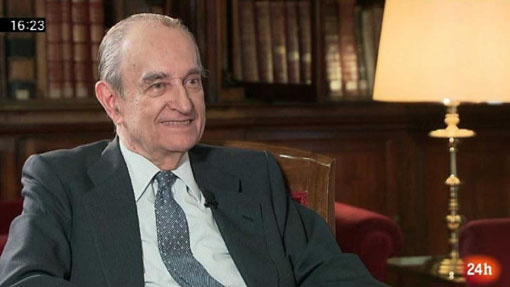
Landelino Lavilla inside the State Council
In July 1976, he was appointed Minister of Justice of the Government of Adolfo Suárez. In the Constituent Legislature of 1977, he was appointed Senator by His Majesty the King Juan Carlos I. Deputy for the province of Jaén, by the Centrist Parliamentary Group (GC), in the elections of 1979, he was elected President of the Congress of Deputies.
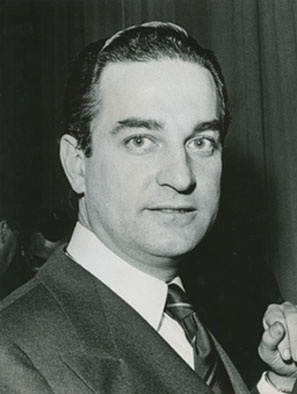
Landelino Lavilla Alsina in 1977
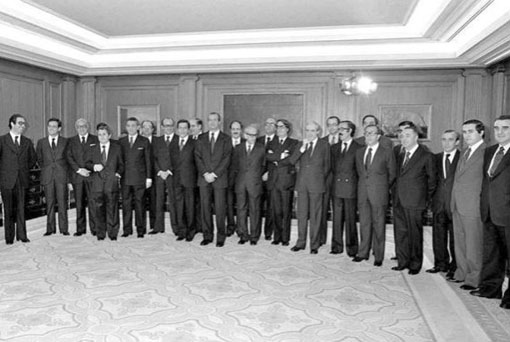
First Government of Adolfo Suarez
a 18 cm.jpg)
Landelino Lavilla and Adolfo Suárez (on the right side)
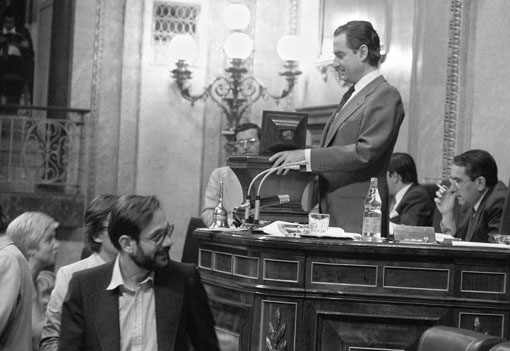
Landelino as President of the Congress of Deputies
Landelino Lavilla, as the Minister of Justice, was one of the impellers of the Constitutional pact.
This is the interview with Landelino Lavilla by Iñigo Alfonso:
Iñigo Alfonso: Mr. Lavilla, good morning. How are you?.
Landelino Lavilla: Very well, also on a specially marked day, that should start well and should end well.
Iñigo: Today, forty years ago, it was a historic step. What do you remember of that morning of December 6, when you went to vote?, I do not know if you were worried, because of the answer, that society was going to give, to that text agreed in the Congress?.
Landelino: There was no restlessness. I believe that we had done such a conscientious, so clean, so generous work and we had mobilised the awareness that we had mobilised the Spanish people with enthusiasm, it was very perceptible. I remember that, in September, when we published the first Draft Law of the Political Reform, I remember that there were those who asked: “ Who is in this?, Who supports you?, and I answered: "We have not done anything else more than making it public and an illusion has been perceived, in the environment, as a tranquility ... ". Why a tranquility?. Well, because I think that there was the awareness that we were new people, serious people, that we posed all that and also in very intelligible terms. Think you that we did all the first operation with a Law of 5 articles --that was the Law for the Political Reform--; of course, invent a formula of that type, that will unite the legal order and that would allow the transformation to be carried out in a calm, peaceful way....--what at that time we called "the reform in opposition to the rupture"--; no, we are going to do it by evolution and, in less than a year, we will have Elections and we will have a Democratic Parliament.
Iñigo: Mr. Lavilla: you were in the first Government of Suárez, in that hinge Executive, which first guided the Law of Political Reform and then facilitating the work of the parliamentary groups, in the Congress, the drafting of the Constitution. Where did the key to the success of this political operation reside?.
Lavilla: We had the King, at the head of the Head of State, which facilitated the operation of transformation by reference; that was a cover. Next, the appointment of Adolfo Suárez, in the Presidency of the Government; Adolfo Suárez, with his mixture of audacity and prudence, made a very serious team, very well chosen; one of the virtues of Adolfo was that he had perception, political sense and all that; it was to make a group of people, who we thought about it seriously, with a task to carry out and a mission, in which what we had to do was to incorporate attachments generously, and those accessions were developed step by step. I remember that, in one of the first steps, certain people told us: "You are naive, it is impossible for this operation, as you have told it, to move forward". But also someone told us: "It is very difficult to get this operation, but if it goes well, it seems good to me and I enter the game".
Iñigo: And this political attitude, in favour of the agreement, do you perceive it today?. Is this attitude present in the political leaders today?.
Lavilla: No. I think that period was a stage and a specific operation, so defined, so sharp and it was so easy to mobilise the generous adhesions, delivered to say: "Here what matters is the objective"; that is to say, here the problem is not to say that one is more right-wing or of left-wing; here what is tried is to see how we achieve a general objective, in which we can achieve an order of coexistence for all ..., as far as we can , on the right, and as far as we get, on the left.
Iñigo: Today Spain is very different from forty years ago and it has very important challenges, including solving the Catalan crisis. I want to ask you, Mr. Lavilla: Does the Constitution provide enough tools to solve this crisis?.
Lavilla: It has to give them; that is, the Constitution, respecting the essence of the Constitution and not considering that it is a sacred text, that can not be touched, can address the novelties, the new needs that are produced, even the deviations, the corrections ... ; in some occasions, they have asked me: "Why did you do that?", it´s just that, at that moment, it had to be done; today, myself maybe would not do so, but at that time it had to be done, because there was a conditioning and we were going to do a certain operation and, for that to go well, we had to do it. They speak to me of the Electoral Law ..., well, the Electoral Law could have corrections but, Do you think that by committing to make Elections, in less than a year, for example we could make an electoral map, with the Single-member districts that they did ...?, How far would we have gotten there, in the lack of understanding ....?. No, we chose the provinces, because here could be the problems that were with the regions, the communities and whatever you want ...; I have always said: "We all felt each one from its province ...", there was no doubt. And then, to take, as a reference, in the organization of the electoral map, the districts, the provinces, greatly simplified; and do not tell me that there are more populated and less populated provinces ..., we have to do a balanced thing, territorially and democratically, and we have to operate on bases, that are accepted and that legitimise the whole process ... and so is how that was developed.
Iñigo: Today is a very happy day for you; I see you happy, Mr. Lavilla.
Lavilla: Man!, It is, it is. It is one day ... well, there was been a period, until things started to twist ...; but well ..., that is ... I do not remember who is the author of the phrase "No one can think of making a Constitution for all generations and for the future", evidently the generational relays come, the problems are also different ... that is to say, because here there are our problems and not our problems, because of course, there are many problems here, which occur in Spain, but also occur in much of the world and here we have the echoes, the resonances of all that. Man! What is it that one can notice of difference ?, because all this could be done without losing the constructive will of understanding, of concord; that is, it is a democratic order, it is a constitutional order, it is a legal order in relation to which coexistence among Spaniards does not have to suffer serious problems --there will be problems, because every day there are problems, but those ruptures, the ones that we were so accustomed to in our history, did not have to exist. And the problem is when the problems begin and, instead of having an answer ,it was to say "Let's find a solution" , as it would have been in our time, although the challenge was different, now we are in a moment where there should be a reaction, to redirect, reorient, that you change what you have to change, you have to place everything by paths through which our coexistence becomes reasonable again--.
Iñigo: Landelino Lavilla, thank you very much for accompanying us, this December 6th. Happy Day of the Constitution.
Lavilla: Thanks to you ... Thank you very much.
Currently, Landelino Lavilla is 84 years old and a Permanent Minister of the State Council.
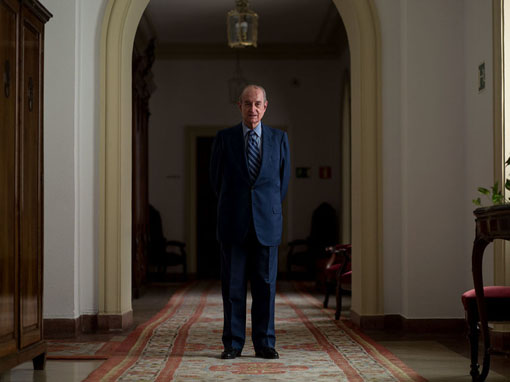
Landelino Lavilla in the State Council
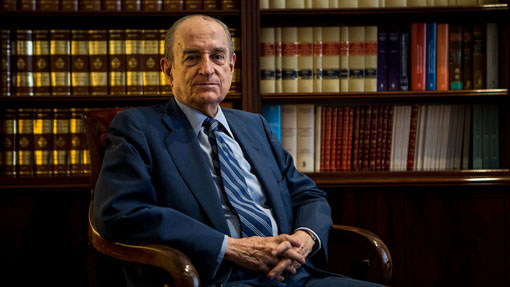
Landelino Lavilla in his office
In another recent interview (in February 2017), Landelino said: "The rupturism, that was marginalised in the Transition, has returned".
Well, I hope that you will like this article.
Until my next post, kind regards,
Luis.
Sponsored by Costaluz Lawyers.
Please click below:
